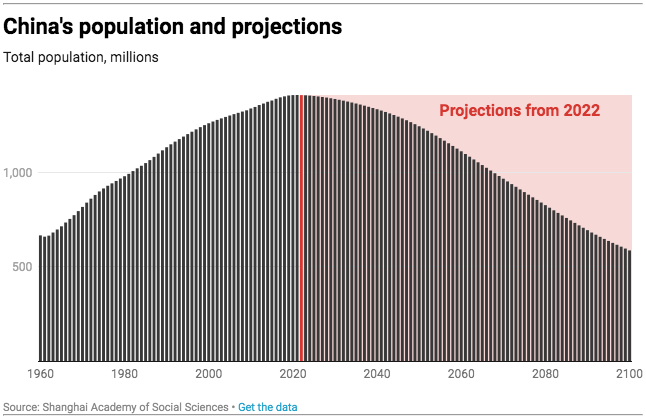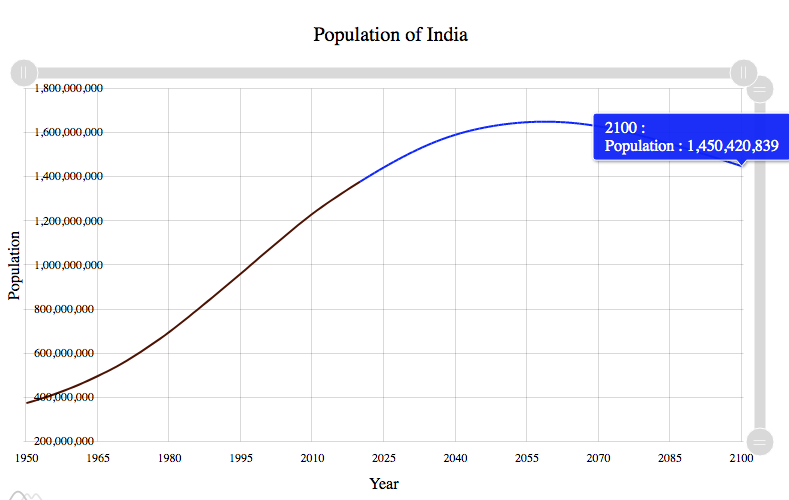Changing of the guard
China’s population appears to have peaked last year at just under 1.413 billion, and has begun what is expected to be a protracted decline to 587 million at the end of the century. By that time, Nigeria will have more people than China.

India’s population is now 1.408 billion, as is rising at about 14 million per year. Thus India is just a few months away from having the world’s largest population. It’s population is expected to exceed 1.65 billion people in the early 2060s, before falling back to 1.45 billion at the end of the century:

Just imagine if British India had not been partitioned; they’d now have 1.8 billion people!
These forecasts are subject to charge. Forecasts of China’s future population have been dramatically trimmed in just the past three years, due to an unexpectedly rapid reduction in their birth rate. It’s also hard to predict how much immigration China will receive in the distant future. If it becomes a first world country, then I’d expect China to import workers to do the jobs that the Chinese don’t wish to do.
It is also very difficult to predict the US population in 2100, as that mostly depends on future decisions we make regarding immigration. If we were serious about competing with China (we are not), we’d accept 100 million high skilled immigrants from China.
The following statement was published in a China news outlet:
China is struggling to overcome young people’s growing reluctance to start families. Over the past year, the government has launched an unprecedented drive to push couples to have more kids, raising the birth limit and introducing a range of policies to support new parents. So far, however, the measures appear to be having almost no effect.
That has to be one of the funniest things I’ve ever read, right up there with Trump saying no one respects women more than he does. AFAIK, China is the only country that limits how many children a woman is allowed to have. To call legal limits on childbirth an “unprecedented drive” for more kids, is like Trump saying he has unprecedented respect for women when he grabs their private parts.
The Chinese government may have its reasons, but to an outsider like me their entire policy regime seems bizarre.
I often see people say the world has too many people or too few people. But they never tell me how they know this. How many people would be optimal? Is it 6,712,334,233 people, or 8,913,212,793 people? Or is it 12,382,008,113 people? Be specific. And how do you know which is the right number? (BTW, the animal kingdom might vote zero as the optimal figure.)
I’m agnostic on population—I acknowledge my ignorance as to the optimal population. My focus is on making the world a better place for those who are here, and those who will be here in the foreseeable future. As for the very long run, who really knows anything?
PS. Scott Alexander is also agnostic.
Tags:


6. August 2022 at 16:09
Populations that increase becasue of people immigrating is good (or the residents of the receiving country and the immigrants) for basically the same reason that trade is good. It could be good for the source country if the emigration promoted changes to make emigration less attractive.
6. August 2022 at 18:56
I keep wondering if the strong economic connections that China is building with sub-Saharan African countries is eventually going to lead to Chinese firms importing African guest workers into China to fill labor shortages. It doesn’t seem to have happened yet, but the potential is there.
I’m not so surprised that incentives to have more children didn’t work. Most incentives regimes don’t work that great at incentivizing more children, either because people have really strong hidden preferences on how many children they really want or because the incentives aren’t big enough. In China and East Asia in particular, child-bearing has an added cost from the intensive test prep stuff – I think it’s a big part of why their birth rates are particularly low.
The darker side is that the Chinese government can be pretty sexist and has far more coercive tools it can try to make women have more children, but even aside from the immorality of such actions (and questions about how effective they could actually be), a China with an aging, declining workforce can’t really spare a major reduction in female labor force participation.
I tend to think that Scott Alexander is on to something about a simple projection out to 2100 being wrong, though, because things might get weird. I’m not a believer in the AI Apocalypse idea, but there is probably not an insignificant chance that we get some type of thing that makes the aging of the population rather redundant – such as radical life extension.
6. August 2022 at 21:56
@Brett. Good insights!(although #2 incentives I had thought of too)
I’m number agnostic on this too. Rate of change and distribution is the issue for most societies. Nigeria and India seem to be very tech savvy to go along with that youth so I’m optimistic on progress.
7. August 2022 at 05:06
I don’t think that a PRC led China will ever be welcoming to immigrants. So I don’t expect China to see many immigrants even if it does become rich, as I don’t see the PRC losing its grip on power. Immigrants are simply not reliable from a political standpoint. Africans certainly would be too religious and many too influenced by ideas of democracy and human rights. Maybe China could recruit immigrants from some of the poorer parts of Southeast Asia, but those immigrants will have choices among countries just as wealthy as China in the region. Pakistan will likely remain relatively poor, but again you would think that the PRC wouldn’t welcome visibly identifiable Muslim immigrants.
7. August 2022 at 07:25
I am not agnostic on world population. I believe too many humans are a big problem. And I do not think there is any solution.
Humans are causing serious problems all over the place.
Here’s an article from Washington Post re: Monarchs.
https://www.washingtonpost.com/climate-environment/2022/07/21/monarch-butterfly-endangered-iucn/
Here’s the key sentence:
“The loss of monarchs underscores a looming extinction crisis worldwide, with profound implications for the humans who have caused it. One million species could disappear, according to the United Nations, a potential calamity not just for plants and animals but also for the people who depend on ecosystems for food and fresh water.”
And, of course, there is the problem of climate change. And that problem will be hard to solve because there are over 1 billion gas/diesel fueled vehicles in the world.
We are also over fishing the oceans, destroying rainforests, and even running out of water in Southwest US.
Bottom line: too many humans means over exploitation of finite resources.
As an economist you should understand this.
7. August 2022 at 08:02
Everyone, The Chinese will bring in Filipinos.
Larry, You said:
“As an economist you should understand this.”
LOL. Your essay lists the downsides and completely ignores the upside of more humans. Do you think I’m a moron? Why would you think such an argument would be persuasive to me or anyone with training in economics. I don’t get it.
My God, at least do a cost/benefit analysis!
7. August 2022 at 09:49
“My God, at least do a cost/benefit analysis!”
I am sorry but a cost/benefit analysis is exactly what my argument is.
More humans means more consumption of finite resources which will eventually lead to death and destruction. This is exactly what has happened to ancient human societies.
Is oil an infinite resource??????
If not I guess you got to start planning what you are going to do when you run out.
Is wheat an infinite resource? Just ask the Africans who are threatened by starvation by the war in Ukraine.
So if you have done a cost/benefit analysis to support your position of more humans might be good, then what is it? You haven’t said.
I know my position of there are/will be too many humans for the earth’s ecosystems to support is a minority position. But I suspect it is a minority position because of the measures that would be required to enforce it. And I know no one wants to go public with such a position because it will boomerang back against them.
7. August 2022 at 10:22
Larry, You said:
“your position of more humans might be good”
As I said in the post, I’m not convinced that more humans would be good, all things considered. But “might” be good? Yeah, that’s kind of obvious isn’t it?
I mean it’s not hard to find people who believe life is better than nonexistence. I’ve even met a few.
SMH.
7. August 2022 at 14:29
You said,
“I mean it’s not hard to find people who believe life is better than nonexistence. I’ve even met a few.”
And I agree. Life is better than nonexistence, for sure.
But too many lives make our lives worse as far as I can tell and so far you have no significant rebuttal to this statement.
Economists do not know very much.
7. August 2022 at 14:29
SMH
8. August 2022 at 08:02
Larry, LOL, (9 + 9 + 9 + 9 + 9) > (10 + 10 + 10)
Is that so hard to understand?
8. August 2022 at 11:33
I naively assume that (1) it’s easier for existing parents to add another child vs a couple having a first child (2) it’s easy for a childless couple to stay childless (3) happily childless couples can’t sell their quota, but (4) One-Child-Policy meant less exposure to siblings, nephews, nieces, and other opportunities to observe and assist with young children, an experience which could reduce anxiety over creating Child 1.
Economists are smarter than me and they keep talking of this “margin” concept, would this possibly inform a wiser population strategy than moving from a limit of 1 to 3? supporting “new” parents seems like a harder marginal problem